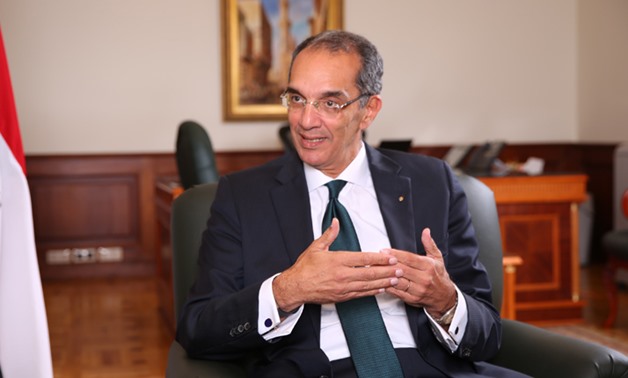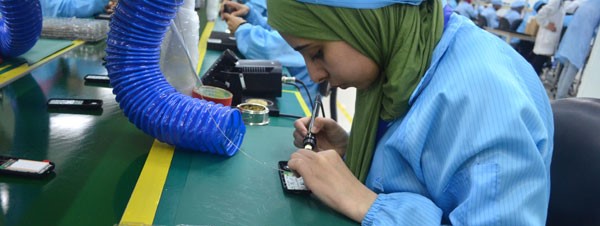As Egypt undertakes its 2030 Vision, the need to move toward a digital economy became paramount. The Ministry of Communications and Information Technology (MCIT) has introduced several reform projects to help digitally transform the government and enhance the connectivity of citizens throughout the country.
The communications and information technology (ICT) industry is projected to grow by 15 percent during the current fiscal year (FY). Furthermore, the sector’s contribution to the country’s gross domestic product is expected to reach 4 percent in FY 2018/2019, increasing to 5 percent by FY 2021/2022.
The ministry is basing its reform plan and growth objectives on two strategic pillars: human development and digital transformation. With a strong focus on educational transformation, the ministry is working on launching Egypt’s first artificial intelligence (AI) technology faculty before the end of the current year.
Additionally, it is working on launching several technology hubs in universities, in order to improve the ICT skills of Egyptian youth before they graduate to enhance the country’s skill-base. Examples include South Valley University in Qena; Menoufia University; Sohag University, and Zagazig University. This is in addition to entrepreneurship-focused technology parks in the New Capital and the cities of Sadat, Assiut, Beni Suef, and Borg el Arab.
To better understand how these ambitious steps will affect the quality of life of the average citizen, Business Monthly sat for a one-on-one with Amr Talaat Minister of ICT.
From a qualitative point of view, how does the ongoing upgrade of Egypt’s digital infrastructure translate to the daily life of Egyptians?
This is something we are very keen on achieving, translating the new initiatives and ongoing projects into tangible improvements in the life of the average citizen.
Egyptians should witness a wide improvement in obtaining government services in the very near future. A few examples include renewing your car license, obtaining municipality services, issuing a copy of your birth certificate, or paying your utility bills. All of these services will soon be done either in post offices or online. Additionally, call centers offering the same set of services will be launched, primarily targeting elderly people who are not comfortable with the previously mentioned options.
The main idea is to have government outlets where government services will be offered with a substantial amount of ease.
Upper Egypt, specifically, deals with a different set of cultural and economic problems than other areas of the country. How is the ministry addressing these differences when implementing its projects?
I have visited Upper Egypt numerous times, and I have a lot of respect for the people there, especially the women and how they embrace social and economic challenges with perseverance, hard work, and determination.
It is our responsibility and commitment to respond to this excellent spirit by ensuring they have access to all the facilities that can help them progress in their careers and lives. We are doing several projects in order to achieve this. We are working on launching a number of innovation hubs at several universities. The main purpose is to foster an ecosystem of innovative thinking and pioneering new ideas.
Furthermore, we are working on education training in Upper Egypt for students and freelancers. Our aim is to help them enhance their skills to compete in the job market both locally and online.
Moreover, we are focused on ideation and acceleration of startups. We are connecting them with investors and creating a platform for them to exhibit their ideas in hopes of securing investments from—or in partnership with—the private sector.
On the health front, we are working with the Ministry of Health on making services available through telemedicine. This should help connect Egyptians in rural villages to medical help.
Finally, to be able to identify underprivileged areas in strongest demand for support, we have partnered with the Ministry of Social Solidarity.
In short, there are a myriad of initiatives that are all going in parallel to help and support our people in Upper Egypt.
Many towns lack access to banks, and some off-the-grid villages don’t even register their births with the government. Does the ministry have a plan to digitally include them?
Of course, it is very important to include these people in social and capacity-building programs. We are currently in collaboration with the Ministry of Youth, setting up internet centers at youth clubs throughout the country. This, hopefully, will help connect people in less-privileged areas. We want young Egyptians in these areas to see the world and what is going on in it.
It is our responsibility to ensure that our youth have internet accessibility.
To boost financial inclusion, the ministry is about to launch a unified card. How will the new card service address the lack of banks in some towns?
I will tell you something; some countries with infrastructure inferior to ours have leaped forward in terms of financial inclusion and in digital banking. We have no excuse not to be there, and I believe we are ready.
The idea of the unified card is to help citizens receive their government entitlements, whether cash or in-kind. This helps bring a vast amount of unbanked people receiving these entitlements into the banking system and the digital economy.
In addition, the service relies on the unique penetration of the postal offices throughout Egypt, where citizens of areas that don’t have banks can access the system through the closest postal office.
Moreover, the card will help the government categorize its employees and identify those who are really in need of support. The concept is multifold and I find this one of the important projects we are currently concerned with.
Realistically speaking, how soon can the government become 100 percent paperless?
We plan to have a pilot in 2020. I don’t want to say paperless, but less dependent on papers. Given that many don’t have the means or skill to deal with the government electronically, we would be excluding citizens if we shift entirely paperless. However, we are moving toward what we call a collaborative government, where all entities connect and communicate well through digital means, thus providing the citizen with easy access to all services.
India has always been able to attract most global communications players on account of its cheap, skilled labor. In your opinion, is the float of the pound and relatively cheaper labor enough to attract some of these companies?
I think we are ready. Our market offers huge opportunities for investors to come. We are now one of the least expensive, if not the least expensive country in terms of skilled labor. Moreover, we have a huge pool of skilled ICT professionals, and we are working diligently on expanding our skill base further.
There is an ecosystem sufficient to foster investment in various sectors of the ICT industry.
Some major players, such as Google, closed their offices in Egypt, while others, such as British Telecom, reversed their plans to open in Egypt. What are their main concerns and how can we attract them?
What we are planning to offer is a portfolio of advantages that make us unique. We have the right infrastructure that connects us well to Europe and Asia, we have the right pool of skills at competitive rates, and now we are completing the picture with the legislative reforms, which include several attractive investment incentives such as tax reductions and free zones within IT technology parks.
These steps are helping us attract such companies back to Egypt.
With the ministry giving significant attention to promoting entrepreneurship in AI, how can these efforts aid local robotics innovation, which isn’t receiving any investments?
Robotics is a very important discipline in ICT and without it we won’t be able to build a competitive manufacturing industry in Egypt. To enhance this sector, we need to partner with both academia and industry in order to strengthen our robotics capabilities, not only in the manufacturing field but in the scientific one as well.
Through our new technology parks, we are working on incubating some of the startups working on robotics. I have seen some impressive projects in Borg el Arab’s technology park and we are helping them spur enough investment to continue their research and development work.
How can the private sector aid the ministry in achieving its goals?
The private sector is at the forefront of the ICT business. I come from the private sector, where I spent more than 35 years. Therefore, I am a firm believer that the private sector is the one leading. The role of the government is to facilitate, manage, and regulate. We are not here to do business ourselves nor to set up companies and trade. We are here to encourage the private sector to invest and create progress.
Any final words to our readers?
We are working diligently to help facilitate their lives by making government services more easily available. We are also working on helping the youth of this country compete more effectively in the local and international labor market. Finally, we are directing all our ICT capabilities toward identifying those in need of government support.







